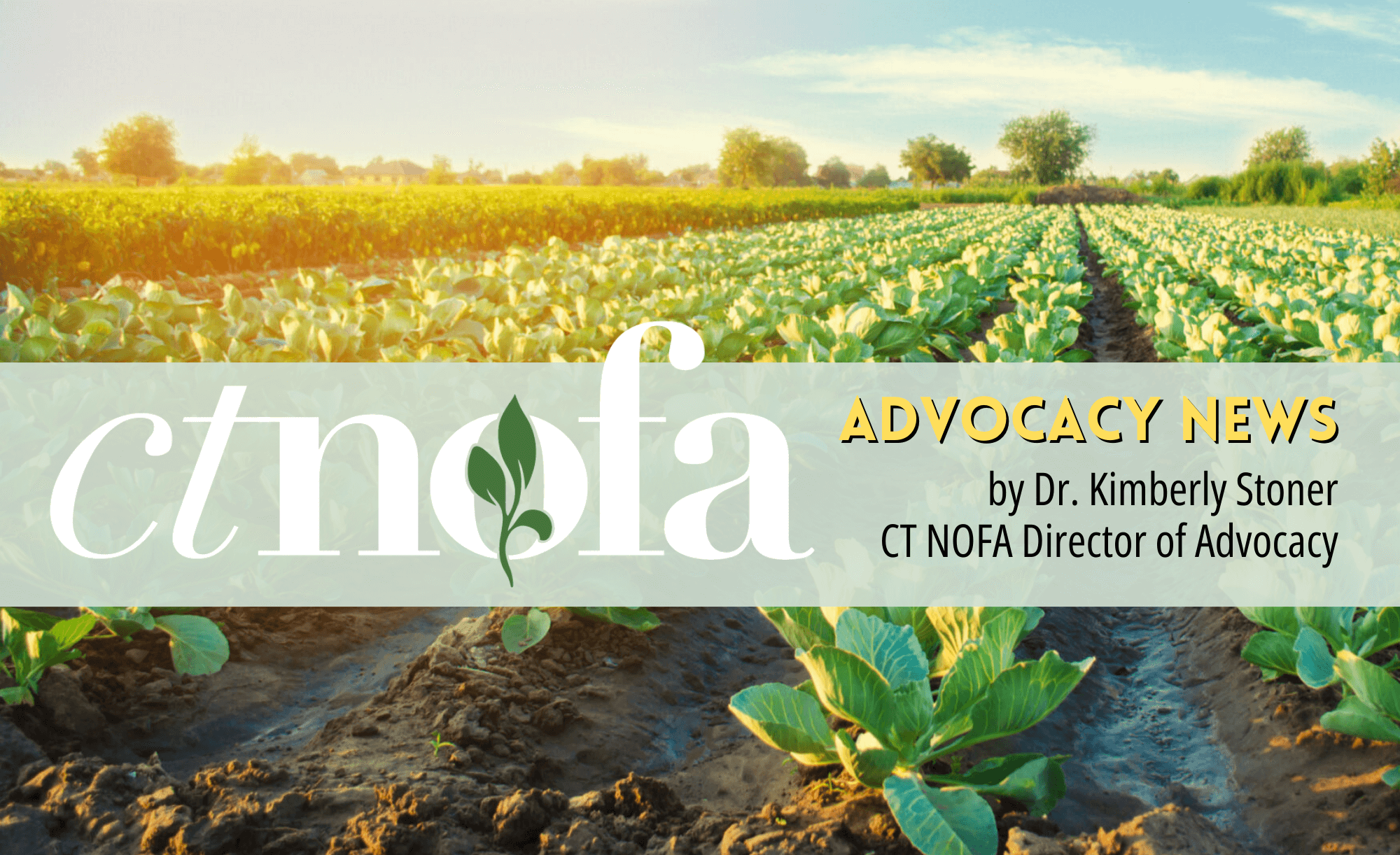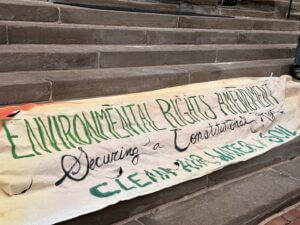Advocacy Update – the Farm Bill is Back!

May 16, 2024
By Dr. Kimberly Stoner, CT NOFA Director of Advocacy
Take Action on the Farm Bill — Again!
The CT General Assembly has finished for this year, just as Farm Bill negotiations in Congress have started to move. This is the time to sign the petition from MOFGA and all of the NOFA chapters demanding that key members of the House and Senate Agriculture Committees keep the $20 billion from the Inflation Reduction Act in conservation programs and continue to fully fund nutrition programs. Sign now!
The $20 billion in Inflation Reduction Act money goes to conservation programs so popular that historically only 1 in 4 farmers applying could be funded. The idea was that this funding would eliminate the backlog, but still the demand has outstripped the funding. And yet, the House Republicans want to strip the remaining funds away.
The nutrition programs in the Farm Bill, particularly the Supplemental Nutrition Assistance Program (SNAP), provide essential assistance to low income people to be able to eat nutritious food. This program greatly reduces poverty and food insecurity, particularly for the elderly, people with disabilities, and families with children.
A Look Back at this Year’s Connecticut Legislative Session
Thank you to all who took action in advocating for legislation that would improve the environment and benefit farmers. Let your legislators know where you stand. You can click on the links for more information about the bills, including which bills your legislators sponsored and how they voted. All the members of the state House and Senate are up for election this November. That’s your opportunity to hold them accountable for what they have done or failed to do.
First the Good News — Bills That Passed
SB 292. PFAS. Bans the sale of a wide range of consumer goods with these “Forever Chemicals” that cause cancer and birth defects, persist for decades, and accumulate in the food chain. It also bans the sale of soil amendments with sewage sludge (aka “biosolids”), which are often contaminated with high levels of PFAS. There are heart-breaking stories from farmers across the country who accepted the application of biosolids on their farms, only to find now, sometimes decades later, that their land, their crops, and their animals are contaminated and their own health affected. This bill passed unanimously in both the House and Senate.
HB 5352. Expanding Solar Projects. Allows for expansion of caps on non-residential solar projects, which have been severely limiting the ability of farmers, among others, to install solar to produce energy to benefit their farming operations. It also simplifies the process for putting up solar canopies (over parking lots, walkways, driveways, etc.). It passed both the House and Senate.
HB 5225. Implementing the Recommendations of the Invasive Plant Council. Adds porcelainberry, mugwort, quackgrass, Japanese angelica tree, Japanese wisteria, and Chinese wisteria to the list of banned invasive plants. Adds callery pear to the list starting in 2027. Calls for a report from the Invasive Plants Council to the Environment Committee on sterile cultivars of Japanese barberry and burning bush and whether they can reasonably be grown in Connecticut. Passed unanimously in both houses and has been signed by the Governor, so it is now Public Act 24-11.
What Happened to All the Bills That Didn’t Pass?
SJ 193. The CT Environmental Rights Amendment. Would have put the rights to clean and healthy air, water, soil, ecosystems, and environment, and a safe and stable climate into the state constitution. Maya van Rossum made the case for this Green Amendment in her keynote speech at the CT NOFA 2024 Winter Conference. After passing the Government Administration and Elections Committee, it did not get a vote in either the Senate or House.
HB 5004. Climate Change. Would have declared a climate crisis, set new goals for lowering greenhouse gas emissions, set up systems for transparency and accountability for greenhouse gas emission and renewable energy, created a whole range of climate incentives for business, encouraged energy efficiency and heat pumps, and other climate-related actions. After hours of debate, it passed the House, but did not get a vote in the Senate.
HB 5228. Option to Purchase Land at Agricultural Value. Would have made agricultural land more affordable by creating an option for farmers preserving land to restrict the purchase of the land to qualified farmers. After passing the Environment Committee unanimously, the Commissioner of Agriculture raised objections and it was never brought to a vote in the House. The House co-chair of the Environment Committee has committed to organizing a working group to resolve the issues.
SB 191. Food Waste Diversion. Would have originally required towns to set up a program for diversion of food waste from the waste stream for recycling. Would also have required generators of food waste (groceries, restaurants, institutions, etc.) to have a plan for donation of excess food and required generators of a certain volume to compost. Was changed completely in the Senate to be about permits for trucks carrying recycling. Passed the Senate in that form, but did not get a vote in the House.
HB 5217 Rodenticides. Would have banned 2nd generation rodenticides, which are highly toxic to predators and scavengers of the dead rodents. After passing the Environment Committee, it was referred to Appropriations where it did not get funding and then did not get a vote in the House or Senate.
SB 190 Neonicotinoids. Was poorly drafted from the start, never clear what it would have done. Had a public hearing but no vote in the Environment Committee.
Recent Posts
Bulk Order NOFA Membership Discounts
The Bulk Order, in its previous format, is no longer taking place. The legacy of the Bulk Order continues – not as a one-time order event, but as an ongoing member benefit that supports growers, and grows over time as we add more vendors and wholesale-level access.
For 2026, we are connecting members to quality organic growing supplies with a direct-to-consumer purchasing option through our program partners: Progressive Grower and Fedco Seeds.
Read MoreTown Halls Across Connecticut Rally Support for Environmental Rights Amendment
Representatives Matt Blumenthal and Gregory Haddad, Senator Mae Flexer, Community Members, and Activists Call for the state legislature to pass an Environmental Rights Amendment during the 2026 Legislative Session
Read More

